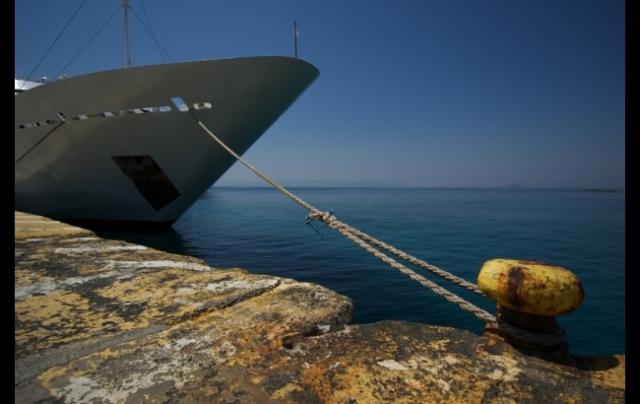Collage: Greek Reporter
Maria S. Topalova
In the week before the elections in Germany, and in anticipation of the next inspection of the supervisory Troika amidst a new wave of unrest in Greece, a forum sponsored by Eurobank had gathered investors in order for them to find out why Greece is not yet attractive to them. Indeed statisticians have reported a primary budget surplus for the first time since the start of the crisis but there is still a financial gap. According to the International Monetary Fund, it is 11 billion euro which must be financed somehow. One option is privatization but it has been delayed. Why is that? Is it for a higher price? Is the Greek private sector slow? Or it is that the Greeks are not yet mature enough to take advantage of the idea of foreign investment?

According to Yiannis Stournaras, Minister of Finance, Greece is on the road to economic recovery and the major factor is the privatization programme which not only will reduce the debt but will provide long-term investments. "It is not acceptable for Greece to have abandoned state-owned enterprises on the one hand and to constantly ask for financial assistance on the other. However, there are many problems; the investors are facing many institutional barriers and the long-term perspective of the Greek economy is bothering them," he admits.
The Finance Minister stressed the positive signs about the Greek economy, namely the lower recession of 3.8% instead of the expected 4.5% despite the major crisis in Cyprus; it is expected that a zero balance of revenue and expenditure will be reported at the end of the year which should remain the same in 2014 too; it is also expected that a budget surplus, albeit small, will be formed at the end of the year as well. The reforms are making progress. One of the most difficult reforms is the liberalization of closed professions. The Minister pointed out that 20 of them had 106 constraints. At present, 85% of them are already removed. For example, after the abolition of cabotage, cruise ships at the port of Piraeus have increased by 45%.
"There has been a steady increase in wages in the private sector since March, which is also a positive sign that something is changing in the Greek economy", said Yiannis Stournaras. He said that it is still early to talk about a third rescue package for Greece, as the finances provided for the country will meet its requirements by the middle of 2014. However, even if such a package is necessary, it will be a lot smaller and, by that time, Greece would have had other alternatives to fill the financial gap. "Deflation is not bothering me as it is logical for prices to start falling during such an intense and prolonged recession. Interestingly, prices started falling this year whereas they remained unchanged during the first four years of recession," the Finance Minister said.
 According to Notis Mitarakis, Deputy Minister of Development, the privatization is associated with the creation of new jobs and with the reduction of unemployment. "Privatization is a tool to achieve economic growth and it will infuse fresh money into the economy. However, we need to change attitudes. Greece is one of the first member states of the European Union but it has failed to attract foreign investment, it is at the rear. For 15 months, the government's goal was to turn the red tape into a red carpet for investors," he said.
According to Notis Mitarakis, Deputy Minister of Development, the privatization is associated with the creation of new jobs and with the reduction of unemployment. "Privatization is a tool to achieve economic growth and it will infuse fresh money into the economy. However, we need to change attitudes. Greece is one of the first member states of the European Union but it has failed to attract foreign investment, it is at the rear. For 15 months, the government's goal was to turn the red tape into a red carpet for investors," he said.
The Deputy Minister stated that 15% of GDP now comes from exports and that significant growth has been registered in tourism. All this is due to the private sector at a time when the banks are not lending and the state is delaying the return of VAT. This year, Greece has climbed 22 places up the rankings of the World Bank for the competitiveness of countries and 5 places up the rankings of the World Economic Forum.
He, however, acknowledged that the most significant problem facing investment is the lack of lending and liquidity. Therefore, one of the major objectives of the government is the bank recapitalization which has been recently completed. "In order for the banks to be able to lend they should be able to borrow. We are using funds from the European Investment Bank for targeted lending and working with the European Bank for Reconstruction and Development. We are not planning to establish a state fund for lending to banks. Unfortunately, major international commercial and investment banks have completely withdrawn from Greece," stated Notis Mitarakis.
"Greece’s state is better today compared to a year ago, but we are still seeing a lack of momentum, Greece is not yet in fashion in the global markets," stated Joly Dixon, Special Adviser to the Task Force for Greece. This is indeed the case although, as stated by Filippos Alexopoulous, manager at the Privatization Agency of Greece, the country has prepared very lucrative deals for the investors.

"Regional airports and ports are the first on the list of privatization, including Piraeus, Thessaloniki and another 10 ports, including Crete. The problem with them is that they include a wide variety of activities, some of which are not attractive to investors. The launching of shares on the stock market is one option and the other is to offer certain activities for concession. With respect to time, Piraeus and Thessaloniki are the most pressing," he said.